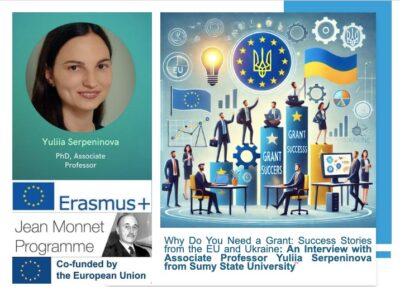Every year, international grants become an integral part of the development of scientific activities and the expansion of educational opportunities for Ukrainian universities. But how does one succeed in obtaining funding from European Union programs? Associate Professor of the Department of Accounting and Taxation at Sumy State University, Yuliia Serpeninova shared her experiences, challenges, and achievements in this field.
– Yuliia, could you please tell us about the grants you have received and which of them serve as successful examples?
– My colleagues and I have submitted many different projects, and among the successful ones, I would highlight two Jean Monnet projects, particularly the Jean Monnet module. We have also had success with bilateral grants, such as the Ukrainian- Austrian and Austrian-Slovak grants. Additionally, I have received several scholarships from the Slovak National Scholarship Program.
– Was it difficult to prepare the application for the Jean Monnet project?
– The first time it was very difficult, as I had no prior experience. The sections of the application seemed unclear to me, but thanks to the help of two more experienced colleagues, we managed to successfully prepare the first project. It took about a month and required significant effort. However, with time and experience, the second application was much easier to prepare.
– What is the specific nature of bilateral grants, and what are their advantages?
– Bilateral grants generally involve cooperation between two institutions, often universities from different countries. These projects aim to lay the foundation for future scientific and organizational cooperation. For example, in our case, the Ukrainian- Austrian and Austrian-Slovak grants helped establish fruitful cooperation between universities, which led to further joint projects and publications.
– What is the likelihood of success when applying for bilateral grants?
– From my experience, out of five submitted applications, two were successful. So, my success rate has been two out of five.
– How do you deal with setbacks when you receive a negative response to an application?
– I try to take it philosophically. Even if an application is not supported, it’s still an experience and an opportunity to expand contacts. For example, when our Slovak-Ukrainian application was rejected, we continued collaborating with colleagues in Bratislava. This eventually led to participation in conferences, joint publications, and even a job offer.
– What experience do you have with individual research grants?
– I particularly enjoy individual scholarships, such as those from the Slovak National Scholarship Program. They involve less bureaucracy, no need to manage a team, and they focus on funding the research of a single scholar. This type of project suits me best.
– What advice would you give to researchers who are just starting to apply for international grants?
– I would advise seeking help from more experienced colleagues who have already had successful applications. This will help you avoid many technical difficulties. It’s also important to not hesitate with your first application, even if it’s challenging. And, of course, prepare your background materials in advance: have a CV, a list of publications, and information about previous projects ready.
Success in grant programs is not only about financial support, but also about new opportunities for developing your scientific career and expanding professional horizons. I wish everyone success!
The publication is prepared within the Jean Monnet module “EU Experiences for Enhancing Youth Employability through Professional Skills Development”, funded by the Erasmus+ program (ERASMUS – JMO -2021-MODULE -SKILLS4JOB-101047867)
Funded by the European Union. Views and opinions expressed are however those of the author(s) only and do not necessarily reflect those of the European Union or the European Education and Culture Executive Agency (EACEA). Neither the European Union nor EACEA can be held responsible for them.
